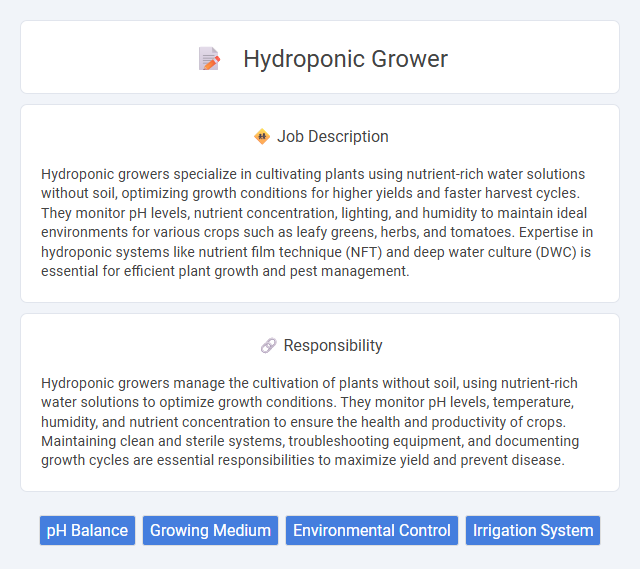
Hydroponic growers specialize in cultivating plants using nutrient-rich water solutions without soil, optimizing growth conditions for higher yields and faster harvest cycles. They monitor pH levels, nutrient concentration, lighting, and humidity to maintain ideal environments for various crops such as leafy greens, herbs, and tomatoes. Expertise in hydroponic systems like nutrient film technique (NFT) and deep water culture (DWC) is essential for efficient plant growth and pest management.
Individuals with strong attention to detail and a passion for sustainable agriculture may find hydroponic growing suitable due to the precise monitoring and control required for optimal plant growth. Those who thrive in controlled, indoor environments and are comfortable with technical equipment might have a higher probability of success in this role. Conversely, people who prefer outdoor work or less structured tasks may find this job less fitting for their preferences and skills.
Qualification
Hydroponic growers require expertise in sustainable agriculture, plant biology, and nutrient management to optimize water-based growing systems. Proficiency with environmental control technologies, pest management, and crop monitoring ensures healthy, high-yield plants. Certifications in horticulture or agricultural science, combined with hands-on experience, are essential for success in hydroponic cultivation.
Responsibility
Hydroponic growers manage the cultivation of plants without soil, using nutrient-rich water solutions to optimize growth conditions. They monitor pH levels, temperature, humidity, and nutrient concentration to ensure the health and productivity of crops. Maintaining clean and sterile systems, troubleshooting equipment, and documenting growth cycles are essential responsibilities to maximize yield and prevent disease.
Benefit
Hydroponic growers likely experience increased crop yields due to optimized nutrient delivery and controlled growing environments. Reduced water usage compared to traditional agriculture may provide significant cost savings and environmental benefits. The ability to grow crops year-round indoors can improve job stability and expand market opportunities.
Challenge
Hydroponic growers likely face challenges related to maintaining optimal nutrient levels and environmental conditions to ensure healthy plant growth. The probability of encountering pest infestations or diseases may increase due to the controlled indoor environment. Navigating the complexities of automated systems and troubleshooting technical issues could also present ongoing difficulties in this role.
Career Advancement
Hydroponic growers specializing in soil-less cultivation techniques can advance their careers by gaining expertise in automated nutrient delivery systems and climate control technologies. Mastery of crop management software and data analytics enhances their ability to optimize yield and quality, paving the way for supervisory or research and development roles. Continuing education in agronomy and plant sciences significantly improves prospects for management positions within commercial hydroponic farms or vertical farming enterprises.
Key Terms
pH Balance
Maintaining precise pH balance is crucial for hydroponic growers to ensure optimal nutrient absorption and healthy plant development. Hydroponic systems require regular monitoring and adjustment of pH levels, typically between 5.5 and 6.5, to prevent nutrient lockout and promote root growth. Expertise in pH testing tools and knowledge of buffering agents enables growers to sustain ideal conditions for high-yield, disease-free crops.
Growing Medium
Hydroponic growers specialize in cultivating plants using nutrient-rich water solutions instead of soil, relying heavily on optimal growing mediums such as coconut coir, rockwool, or clay pellets. These growing mediums provide essential support to plant roots, enhance aeration, and facilitate efficient nutrient absorption for maximum yield. Mastery in selecting and maintaining the right growing medium directly impacts hydroponic system productivity and plant health.
Environmental Control
Hydroponic grower roles emphasize precise environmental control to optimize plant growth by regulating temperature, humidity, light intensity, and CO2 levels within indoor systems. Advanced sensors and automated climate control systems ensure consistent conditions, promoting faster growth cycles and higher yields while minimizing resource use. Effective environmental management reduces pest risks and enhances nutrient absorption, directly impacting crop quality and sustainability in hydroponic agriculture.
Irrigation System
Hydroponic growers specialize in managing advanced irrigation systems that deliver precise nutrient and water solutions directly to plant roots, maximizing growth efficiency and yield. These systems often incorporate automated drip or ebb-and-flow techniques to optimize hydration while conserving water resources. Understanding the calibration and maintenance of sensors and pumps is critical to sustaining ideal moisture levels and nutrient balance in the hydroponic environment.
 kuljobs.com
kuljobs.com